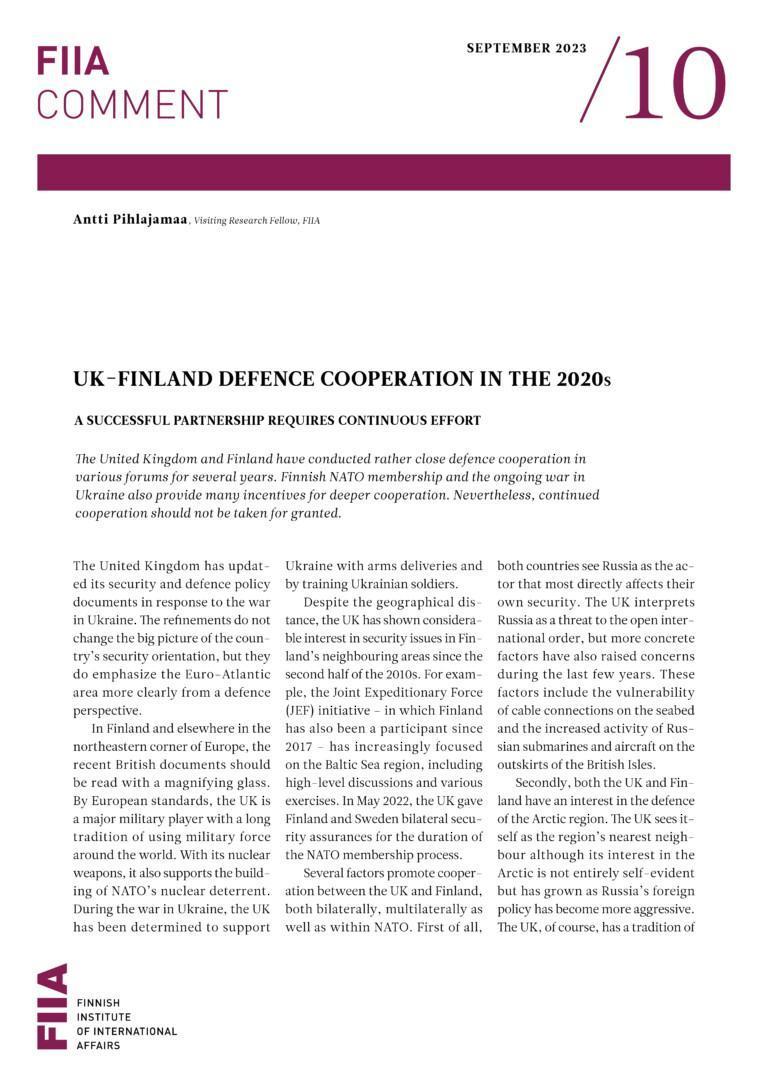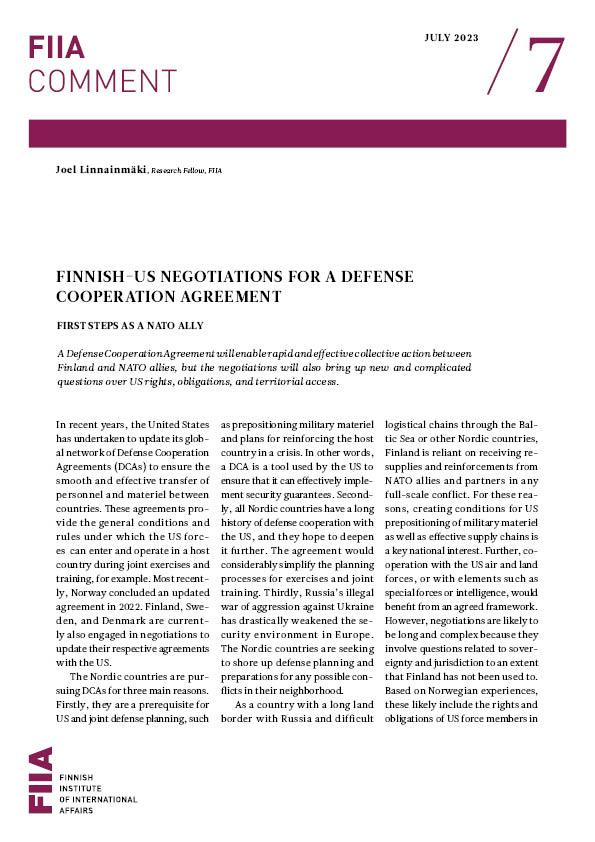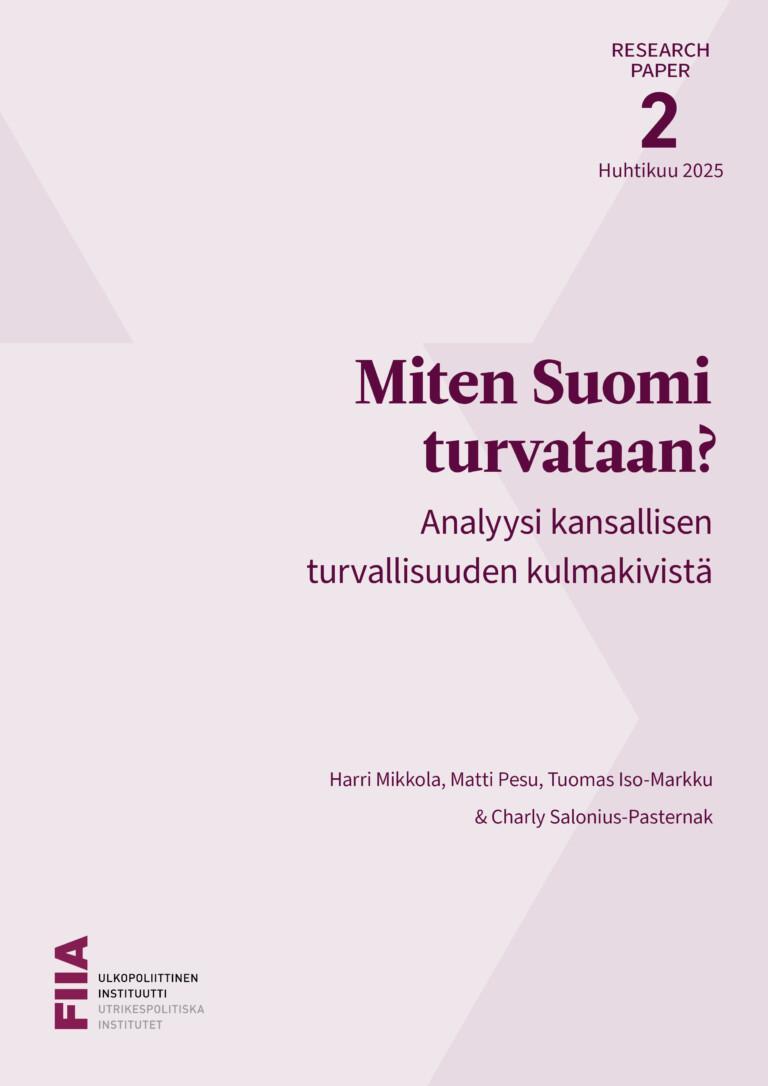
The United Kingdom and Finland have conducted rather close defence cooperation in various forums for several years. Finnish NATO membership and the ongoing war in Ukraine also provide many incentives for deeper cooperation. Nevertheless, continued cooperation should not be taken for granted.
The United Kingdom has updated its security and defence policy documents in response to the war in Ukraine. The refinements do not change the big picture of the country's security orientation, but they do emphasize the Euro-Atlantic area more clearly from a defence perspective.
In Finland and elsewhere in the northeastern corner of Europe, the recent British documents should be read with a magnifying glass. By European standards, the UK is a major military player with a long tradition of using military force around the world. With its nuclear weapons, it also supports the building of NATO's nuclear deterrent. During the war in Ukraine, the UK has been determined to support Ukraine with arms deliveries and by training Ukrainian soldiers.
Despite the geographical distance, the UK has shown considerable interest in security issues in Finland's neighbouring areas since the second half of the 2010s. For example, the Joint Expeditionary Force (JEF) initiative – in which Finland has also been a participant since 2017 – has increasingly focused on the Baltic Sea region, including high-level discussions and various exercises. In May 2022, the UK gave Finland and Sweden bilateral security assurances for the duration of the NATO membership process.
Several factors promote cooperation between the UK and Finland, both bilaterally, multilaterally as well as within NATO. First of all, both countries see Russia as the actor that most directly affects their own security. The UK interprets Russia as a threat to the open international order, but more concrete factors have also raised concerns during the last few years. These factors include the vulnerability of cable connections on the seabed and the increased activity of Russian submarines and aircraft on the outskirts of the British Isles.
Secondly, both the UK and Finland have an interest in the defence of the Arctic region. The UK sees itself as the region’s nearest neighbour although its interest in the Arctic is not entirely self-evident but has grown as Russia's foreign policy has become more aggressive. The UK, of course, has a tradition of military action in the northern regions dating back to the Cold War.
Thirdly, cooperation at the practical level offers potential benefits for both sides. For example, the Royal Air Force trained with the Finnish Army in Finland in July 2023 and conducted an air-to-ground drop to the target designated by a Finnish joint terminal attack controller. In such exercises, Finland can continue to gain experience of demanding and wartime-relevant cooperation, while the UK has the opportunity to train with an actor that has never forgotten the possibility of large-scale war. Joint training also strengthens deterrence and efforts to prevent conflicts.
Fourthly, it is noteworthy that the UK increasingly sees defence as a matter for the whole society. That is why Finland's tradition of comprehensive security and comprehensive defence is of interest, and the UK hopes to learn from it in order to strengthen the resilience of its society. Although the concept of Finnish comprehensive security is not unfamiliar abroad, there is immeasurable potential for practical international cooperation in this field.
However, there are also limitations to deepening cooperation. In Northern Europe, Finland is not the UK's sole partner; the UK also directs its attention towards other partners, such as Estonia. The UK has long been in charge of the NATO battlegroup stationed in Estonia, and at the end of 2022, the two countries issued a joint declaration aimed at further strengthening the UK's role in Estonia's defence. Defence cooperation with Poland, for example, has also deepened in recent years. Moreover, it is noteworthy that the UK’s recently announced additional defence funding will largely be directed towards developing nuclear deterrence and replenishing ammunition stockpiles, which have limited relevance for defence cooperation with Northern European countries, including Finland.
Another limiting factor might be the tradition of Britain’s global role. At present, the focus of British defence policy seems to be on the Euro-Atlantic area. However, the global perspective on defence issues has not totally disappeared. For example, the UK is involved in the development of a nuclear-powered submarine with the United States and Australia. How can these global ambitions be linked to the country’s Euro-Atlantic priorities? And more importantly, will that priority remain when the war in Ukraine is over?
Finally, Finnish-British defence cooperation takes place in a context where the two countries have differing perceptions of how to build and use military force. British texts, for example, convey a deep-seated and strong conviction that technological progress will bring military advantages. Of course, the most advanced weapons technology has been and will be introduced in Finland too, but Finland also places great emphasis on large reserves and the strong will to defend the country, for example. Such differences do not preclude cooperation but set the framework conditions for what can be expected of it.
As a capable European military actor, the UK is a valuable ally for Finland, both in the context of deterrence and defence. As a frontline country, it is important for Finland to maintain and develop the cooperation. This requires identifying Finland’s own goals and the UK’s interests as clearly as possible to find the best areas for cooperation.











